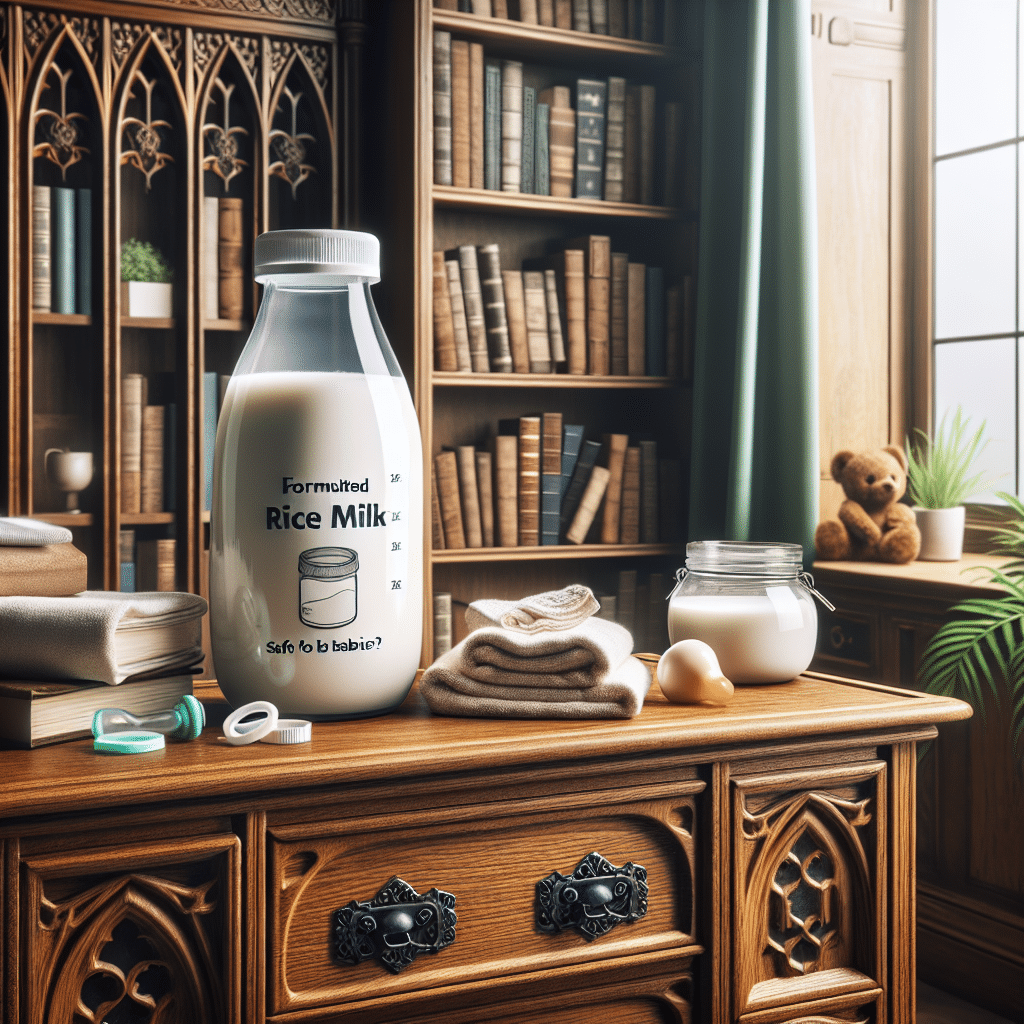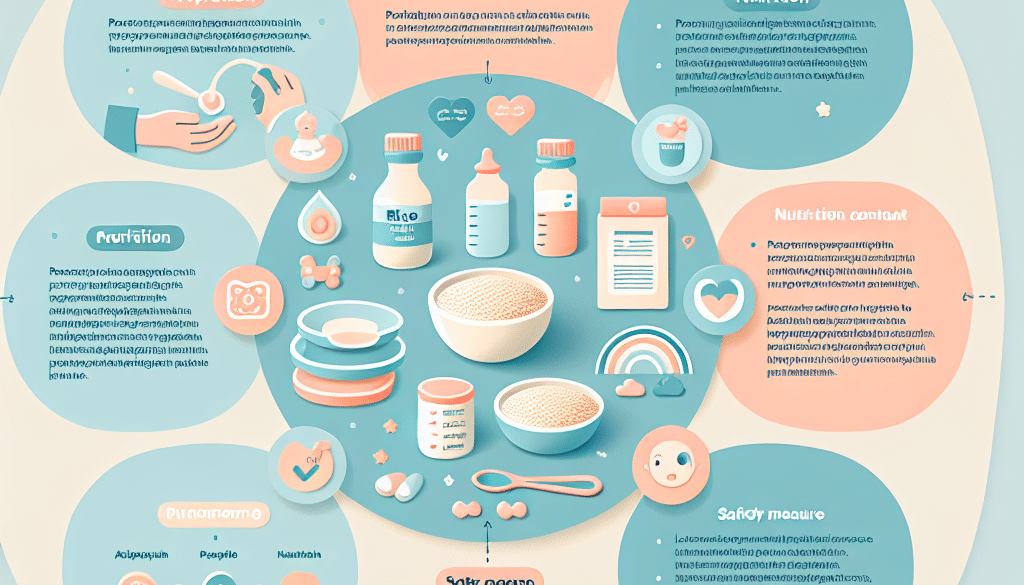Rice Formula: Safe for Babies?
-
Table of Contents
- Rice Formula for Babies: Evaluating Safety and Nutritional Benefits
- Understanding Rice Formula
- The Nutritional Profile of Rice Formula
- Is Rice Formula Safe for Babies?
- Arsenic in Rice Formula
- Regulatory Standards and Recommendations
- Alternatives to Rice Formula
- Case Studies and Research on Rice Formula Safety
- Best Practices for Using Rice Formula
- Conclusion: Balancing Nutrition and Safety
- Discover ETprotein’s High-Quality Protein Products
Rice Formula for Babies: Evaluating Safety and Nutritional Benefits

When it comes to infant nutrition, parents and caregivers often find themselves navigating a complex landscape of options, recommendations, and safety concerns. Rice formula, a common weaning food and supplement for babies, has been a topic of discussion among health professionals and parents alike. This article delves into the safety and nutritional aspects of rice formula for babies, providing a comprehensive overview of what you need to know.
Understanding Rice Formula
Rice formula typically refers to infant formula or cereal made primarily from rice grains. It is often used as a first solid food for babies due to its smooth texture and hypoallergenic properties. However, the safety and nutritional value of rice formula have come under scrutiny due to concerns about arsenic levels and nutrient content.
The Nutritional Profile of Rice Formula
Rice is a carbohydrate-rich grain that provides energy, but on its own, it lacks some essential nutrients necessary for a baby’s growth and development. To address this, many rice formulas are fortified with vitamins and minerals such as iron, zinc, and B vitamins. Here’s a breakdown of the typical nutritional enhancements found in rice formula:
- Iron: Essential for healthy blood and cognitive development.
- Zinc: Important for immune function and cell growth.
- B Vitamins: Aid in energy metabolism and nervous system health.
- Vitamin C: Helps with the absorption of iron and supports the immune system.
- Calcium: Crucial for bone and teeth development.
Is Rice Formula Safe for Babies?
The safety of rice formula has been questioned due to the potential presence of arsenic, a toxic element that can occur naturally in the environment or as a result of agricultural practices. Inorganic arsenic, the type found in contaminated water and some foods, is a known carcinogen and can pose health risks if consumed in high amounts over time.
Arsenic in Rice Formula
Studies have shown that rice can absorb more arsenic from the environment compared to other grains. This is because rice is often grown in water-flooded conditions, which can lead to higher uptake of arsenic if present in the water or soil. As a result, rice-based products, including infant formula, can contain varying levels of arsenic.
Regulatory Standards and Recommendations
In response to concerns about arsenic in rice formula, regulatory bodies such as the U.S. Food and Drug Administration (FDA) and the European Food Safety Authority (EFSA) have established guidelines and maximum allowable levels for arsenic in infant rice cereal. These guidelines aim to protect infants from potential harm while still allowing them to benefit from rice-based products.
Alternatives to Rice Formula
Given the concerns about arsenic, some parents may choose to explore alternatives to rice formula. Options include oatmeal, barley, and multigrain cereals, which are less likely to contain high levels of arsenic. Additionally, these alternatives can offer a broader range of nutrients and textures for babies.
Case Studies and Research on Rice Formula Safety
Several studies have investigated the levels of arsenic in rice formula and its potential impact on infant health. For example, a study published in the journal “JAMA Pediatrics” found that infants who consumed rice cereal had higher urinary arsenic levels compared to those who did not. However, the long-term health implications of these findings are still being researched.
Best Practices for Using Rice Formula
If you choose to use rice formula for your baby, there are steps you can take to minimize potential risks:
- Vary your baby’s diet to include a mix of grains and cereals.
- Look for rice formulas that are specifically labeled as low-arsenic.
- Prepare rice formula with water that is known to be low in arsenic.
- Follow portion recommendations to avoid excessive consumption of rice products.
Conclusion: Balancing Nutrition and Safety
Rice formula can be a safe and nutritious option for babies when used appropriately and as part of a balanced diet. It is important for parents and caregivers to stay informed about the latest research and guidelines regarding arsenic in rice products and to consult with healthcare professionals when making decisions about infant nutrition.
By understanding the potential risks and taking proactive measures, you can ensure that your baby reaps the benefits of rice formula without undue exposure to contaminants. Remember to always prioritize variety in your baby’s diet to support their overall health and development.
Discover ETprotein’s High-Quality Protein Products
If you’re looking for safe and nutritious protein options for your family, consider ETprotein’s range of organic and plant-based protein products. Their commitment to quality and safety makes them a trusted choice for consumers seeking healthy protein sources.
About ETprotein:
ETprotein, a reputable protein Chinese factory manufacturer and supplier, is renowned for producing, stocking, exporting, and delivering the highest quality organic bulk vegan protein and plant proteins. They include Organic rice protein, clear rice protein, pea protein, clear pea protein, pumpkin seed protein, sunflower seed protein, mung bean protein, etc. Their offerings, characterized by a neutral taste, non-GMO, allergen-free attributes, cater to a diverse range of industries. They serve nutraceutical, pharmaceutical, cosmeceutical, veterinary, as well as food and beverage finished product distributors, traders, and manufacturers across Europe, USA, Canada, Australia, Thailand, Japan, Korea, Brazil, and Chile, among others.
ETprotein specialization includes exporting and delivering tailor-made protein powder and finished nutritional supplements. Their extensive product range covers sectors like Food and Beverage, Sports Nutrition, Weight Management, Dietary Supplements, Health and Wellness Products, and Infant Formula, ensuring comprehensive solutions to meet all your protein needs.
As a trusted company by leading global food and beverage brands and Fortune 500 companies, ETprotein reinforces China’s reputation in the global arena. For more information or to sample their products, please contact them and email sales(at)ETprotein.com today.












